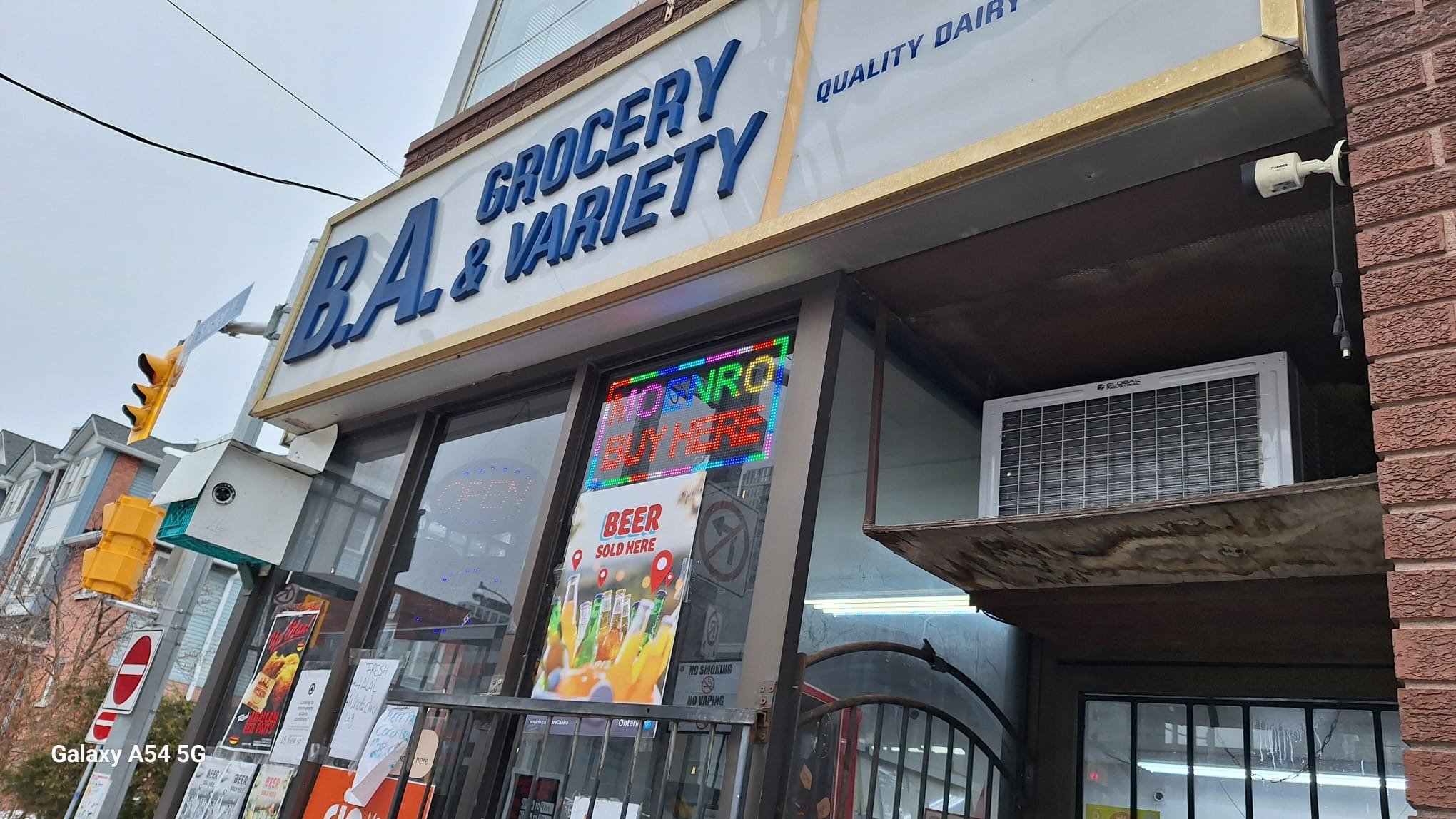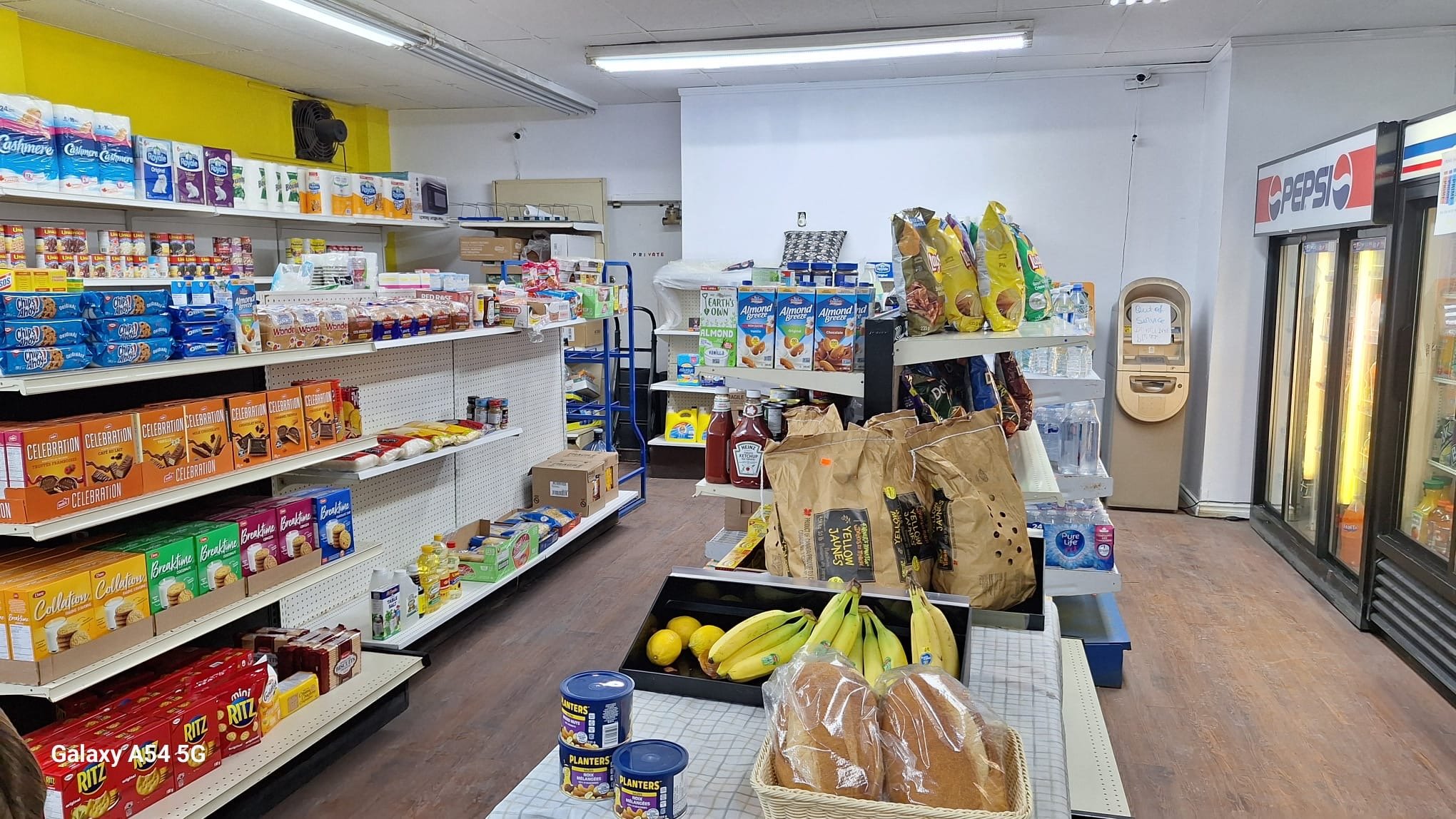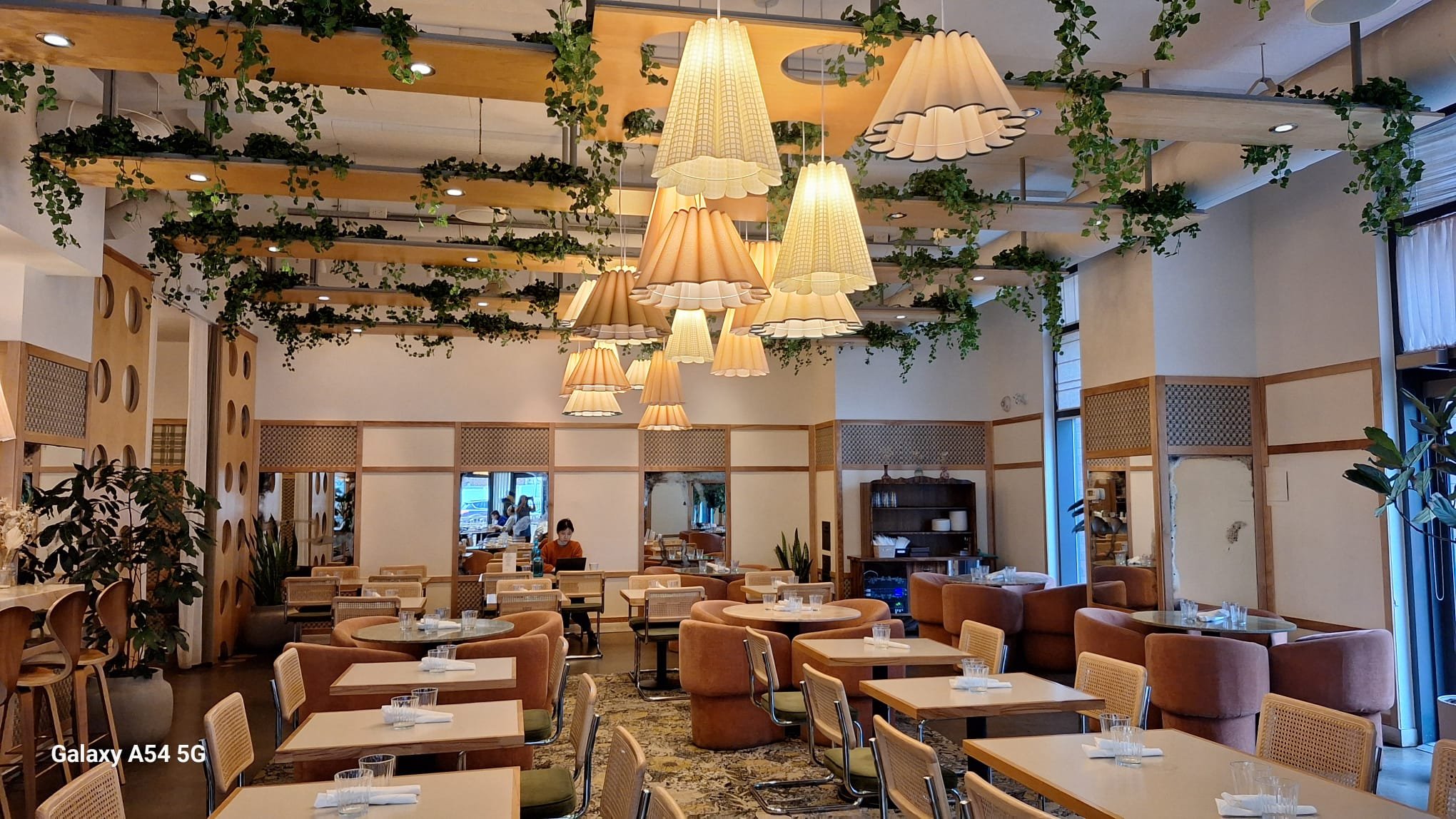The Corner Shop Chronicles’ podcast and interactive map can be accessed here.
For years, Regent Park was trapped in a cycle of negative perceptions by being framed as a neighborhood rife with crime and poverty. Despite these views, local entrepreneurs thrived and built their businesses on the foundations of community, customer loyalty, and personal connections. Regent Park’s redevelopment has uprooted these foundations, creating a significant void in the area’s business landscape. In this article, we will explore Regent Park’s small businesses in depth, highlighting the successes and challenges that local business owners have encountered on their journeys to becoming entrepreneurs. We will also examine how these entrepreneurs are reviving the once-thriving business scene.
Background:
Regent Park is Canada’s first and largest public housing project and is in the midst of its second redevelopment, which began in 2005. Regent Park was framed by city officials as a ‘slum’ in dire need of complete urban renewal. The news cycle and media blamed the deteriorating conditions of the housing stock on the predominantly marginalized residents rather than the landlords in charge of upkeep. City planners saw Regent Park as a haven for crime, poverty and delinquency (1). The city’s plan to fix it? To introduce mixed-income and mixed-use housing into the area, ‘deconcentrate’ poverty, and alter the social composition of the neighbourhood (2)
While the city’s plan was well intentioned, the reality is that the redevelopment has been far more disruptive than anticipated. The transformation of Regent Park has not just altered its skyline but fundamentally altered its retail and economic landscape. Many essential spaces in the neighbourhood, such as Small Ethnic Grocery Stores (SERGs), which are vital to Regent Park’s identity and community consumption, have closed (3). For many Regent Park residents, spaces like SERGs are crucial to a sense of belonging; these stores weren’t just places to buy food—they were vital to maintaining a connection to their cultural roots and forging ties with others with similar backgrounds (4). Small businesses like SERGs were the bricks that built the community up by creating a sense of belonging and shared history for residents. However, despite their significance to the internal community of Regent Park, these businesses are invisible to the greater population of Toronto, leaving the broader narrative to frame Regent Park as a place of urban decline.
This narrative was peddled by the mainstream media, who played an instrumental role in shaping the public’s perception of the neighbourhood for the worse. News coverage often spotlighted organized crime, violence, and drug usage, which framed Regent Park not as the vibrant neighbourhood it was, but instead, a dangerous outlier within Toronto. The result of this narrative? A repellent effect which encouraged outside visitors to steer clear of Regent Park. Residents from surrounding areas who might have otherwise frequented Regent Park’s local businesses chose to take their business elsewhere instead. This had a knock-on effect where hopeful entrepreneurs looking to begin had to battle not only the usual hurdles of running a company but also trying to convince their prospective clientele that the neighbourhood was safe, welcoming, and worth visiting. The media-induced stigma fomented real-world barriers for business owners in Regent Park. As a result, foot traffic slowed, sales declined, and the economic vitality of Regent Park, which was already strained by redevelopment and displacement, was further weakened by reputational damage. In a city as vast as Toronto, there is a wide range of neighbourhoods to choose to go and shop. As a result, public perception of the area a business is located in can make all the difference between thriving and folding. For many Regent Park stores, the uphill climb of maintaining a business was made heavier by the weight of stigma. Nevertheless, many have found success in this difficult scenario and, against all odds, created a thriving entrepreneurial scene. Their experience in tackling both stigma and the challenges of running a successful business makes them instrumental in understanding how economic justice can be better understood in Regent Park’s context.
In addition to the stigma surrounding Regent Park, the COVID-19 pandemic considerably impacted the community and its small businesses. Many small businesses were forced to shut down when the Government of Ontario declared a state of emergency in March 2020; all of these businesses were classified as non-essential by the government (5). Importantly, many of these businesses were also affected because, unlike larger chain stores, they lacked the resources to move their operations online (6). Moving a business online requires ample planning, capital, and human resources. Many entrepreneurs were also hesitant to take loans from the government out of fear that they would not be able to repay them (7). The pandemic also greatly impacted the community of Regent Park, which was vital for small businesses. Without community support and customer loyalty, many businesses experienced a significant loss of revenue.
While the pandemic presented immediate challenges for small businesses in Regent Park, longer-term efforts were already underway to address economic concerns and support local businesses. The City of Toronto and the Daniels Corporation created the Social Development Plan (SDP) and its various subcommittees to combat issues raised during the redevelopment. The SDP was first implemented in 2007. At the time, it had 75 recommendations for tackling the social change brought to Regent because of its redevelopment from social housing to a mixed housing and mixed-use community (8). Every year, the SDP Strategic Planning Committee works to ensure the SDP stays relevant, effective and strategic (9). The City claims the SDP is “Maximizing social and economic opportunities for residents, businesses, community agencies and other stakeholders” and “...increas[ing] sustainable employment rates and entrepreneurial opportunities for residents.” (10) Notably, the Employment and Economic Working Group (EED), a subcommittee of the SDP, is tasked with “Increas[ing] employment rates and entrepreneurial opportunities for local residents.” (11)
While the SDP laid the groundwork for addressing certain challenges, individuals like Elena Taghizadeh bring the plan to life, ensuring its success. Elena is a familiar face in Regent Park, where she has long been a resident and an advocate for the community. As co-chair of the Employment and Education Development Plan (EED), Elena has witnessed firsthand the implementation of the SDP. She believes in its power to bolster local entrepreneurship in Regent. For her, the EED represents more than just a program—it’s a bridge for rebuilding the economic fabric of Regent Park. As a Corner Shop Chronicles team member, Elena explained that her work for the EED involves mitigating the gaps between Regent Park residents and businesses seeking employees through the “workforce integrator.” She also mentioned that the EED works with Regent Park residents to provide them with training, certifications and even resume help should they need it. Elena’s work also includes planning and executing many promotional events and educational programs for the EED, hoping to involve as many Regent Park residents as possible. For Elena, the work of the EED is vital for Regent Park post-redevelopment because it is a practical solution for local entrepreneurs. It helps them combat the issues brought forward by the redevelopment and promotes economic equity.
Picture of Project Chronicles team member, Regent Park Resident and EED Co-Chair, Elena Taghizadeh. Photo Credit: Dawar Naeem from Regent Park Focus Media Centre.
Local entrepreneurs are making a comeback:
The EED was created to support local entrepreneurs like Mohammad of Mo’s Milshakes and More, who are working hard to grow their businesses and revive the Regent Park business scene. Mo, a lifelong resident of Regent Park, is inspired by his mother’s cooking and heritage and is passionate about selling fusion Somalian and Canadian foods. For Mo, creating and selling his products brings him a profound connection to his family and culture. Mo is dedicated to making every customer feel special; he mentioned that the most rewarding part of running his business is seeing the smiles on customers’ faces when they enjoy his food. Mo’s Milshakes and More is located in the Carousel Cafe within the Daniels Spectrum building and operates Monday to Friday from 9 AM to 9 PM.
As a new business owner and long-time resident, Mo has experienced the redevelopment from various perspectives; he shared with us the numerous changes it has brought to Regent Park. Mo remarked that the redevelopment has resulted in both positive and negative effects for the area. As a business owner, he stated that the redevelopment has been crucial for networking, allowing him to reach a broader customer base. He mentioned that due to this growth, he has been given the opportunity to participate in regional events such as Taste of Regent Park and Taste of North York. However, the redevelopment has also led to increased rent prices and heightened competition. Notably, this is also under an economy where grocery prices are exorbitant nationwide. Many local entrepreneurs like Mo face fierce competition from large chain stores, making it difficult for small businesses to promote themselves and thrive. Larger businesses have the capital required for additional resources, marketing, and employment. The threat of large businesses is prominent in Regent Park because the more large businesses that enter the area, the more the culture of the area is lost. Small businesses such as Mo’s, which have a unique story and sell unique items, set Regent Park’s small business market apart from others in the city. Ensuring smaller businesses have a voice against the grain of larger companies within the financial landscape of Regent Park assists the community in becoming more economically just for all.
Despite these challenges, Mo is determined to embrace change, stating, "The old Regent Park was one big family and now the family got bigger, this is the only difference…” and, “In my experience, this is the best community in all of Canada… from my personal experience, I really believe that.” In the coming years, Mo hopes to expand his business beyond Regent Park, opening new locations and reaching a broader customer base.
Mohammad (Mo) from Mo’s Milkshakes and More at the Carousel Cafe in the Daniles Spectrum Building. Photo Credit: Elena Taghizadeh.
Many local entrepreneurs share the struggles faced by Mo. Patricia Richards, a member of Corner Shop Chronicles and a Regent Park resident for over twenty years, has recently embarked on her entrepreneurial journey after leaving the corporate banking world. She is focused on turning her passions into her livelihood. Echoing the struggles faced by Mo, Patricia mentioned to us that she wishes there were more dedicated spaces for entrepreneurs in Regent Park. She proposed a year-long venue for resident entrepreneurs to establish themselves and sell their products to community members. After these entrepreneurs can rent their own space, the venue is given to a new business. Patricia states, "Residents should have first priority for space… instead of bringing in Tim Hortons and Shoppers because we have those things already five minutes away… we should help the residents first before the bigger franchises.” This is a crucial point; before the redevelopment, community relations in Regent Park were deep and extensive; however, this bond was fractured when many residents were displaced during the redevelopment. Additionally, the sense of community further diminished due to the COVID-19 pandemic. Prioritizing entrepreneurs like Patricia, whose products unite residents of the neighbourhood, helps to rebuild these community ties, subsequently challenging the stigma of Regent Park as a place of urban decline.
Patricia sells crochet clothing items as well as Rastafarian-inspired food products. She sells her products at local events under the domain name “Kemba Veg Spot.” She strongly believes in the sentiment that ‘health is wealth’ and brings this mentality to her cooking. She is also a firm believer in using food to unite the community. Patricia has recently obtained her food safety certification and is beginning a new cooking course to refine her skills further. She shared that the most rewarding aspect of her business is seeing customers enjoy her food; she takes great pleasure in knowing her cooking brings them joy.
Eventually, Patricia hopes to have her own space to sell her products. She is passionate about starting a catering business sometime in the future when she has collected all the qualifications provided by her ongoing cooking courses.
A picture of Patricia Richards, long-time resident of Regent Park, Entrepreneur, and owner of Kemba Veg Spot. Photo Credits: Elena Taghizadeh.
A Picture of Patricia’s Crochet Creations. Picture Credits: Patricia Richards.
A Picture of Patricia’s Food Station called “Kemba Veg Spot.” Picture Credits: Patricia Richards.
Another resident entrepreneur working hard to break the stigma and revive the business scene of Regent Park is Pereira Santos of B.A. Grocery and Variety. Pereira became an entrepreneur to achieve economic freedom from the harsh and unpredictable conditions attached to working blue-collar and gig economy jobs. While he enjoys the financial independence of self-employment, Pereira finds it hard to keep B.A. afloat; as the sole employee at B.A., Pereira works tirelessly to ensure his grocery store is well-stocked and staffed. This is a common sentiment among small business owners in Regent Park, mainly because the neighborhood faces economic struggles and transient customers (12).
Pereira works diligently so that B.A. can remain a store dedicated to helping the community; he stocks essential grocery and personal items and strives to keep his prices as low as possible for residents. He mentioned that he feels a sense of reward and accomplishment when community members visit his store frequently. Building community support is a significant goal for entrepreneurs like Pereira. After the redevelopment of Regent Park, support for small businesses dwindled. The reasons for this include the displacement of many residents, the arrival of large chain stores in the area, and the COVID-19 pandemic. Furthermore, due to the redevelopment and the emergence of big-box grocery stores, Pereira faces challenges from competition. He noted that competition impacts various aspects of his business, from initial capital investment to advertising to prices.
At a time when small businesses are struggling to survive amid the neighborhood’s transformation, community support for stores like B.A. is more crucial than ever. Supporting small businesses such as B.A. aids in rebuilding the retail market in Regent Park and also helps challenge the stigma surrounding the area. Organizing support unites the community around a central cause and reduces the stereotypes of delinquency that the media often perpetuates.
In the coming years, Pereira hopes to attract more customers to B.A. and grow his business; he wants to continue to support the community through his entrepreneurship. For further inquiries, B.A. Grocery and Variety is located at 140 Sackville Street and opens at 11:30 AM daily. It is also available on Skip the Dishes for delivery.
Picture of the outside of B.A. Grocery and Variety. Photo Credit: Elena Taghizadeh.
Picture of the inside of B.A. Grocery and Variety. Photo Credit: Elena Taghizadeh.
Lastly, Andrew, the manager of Café ZUZU, provides a unique perspective on the stigmatization and challenges entrepreneurs face after redevelopment. Café ZUZU is a café, restaurant, and retail shop located at 555 Dundas Street East. It is a relatively new business that began calling Regent Park its home following the previous stage of redevelopment. Café ZUZU belongs to a larger restaurant investment group called Gusteau 54, which has numerous restaurants throughout the city of Toronto but was particularly interested in opening a location in Regent.
For Andrew and the rest of the Café ZUZU team, the goal is to bring new customers to Regent Park and simultaneously fight the stigma surrounding the neighbourhood. Andrew stated, “...it’s been wonderful to see many new people come into our space, many people who either hadn’t been to Regent Park in a while or never had been to Regent Park to come here and be a part of what we’re doing….” The story of Café ZUZU brings a different yet vital perspective to this article: new businesses that are not necessarily tailored for intra-community needs also have a large part to play in crushing the lingering negative stereotypes about Regent Park and in rebuilding the business scene.
Notably, Andrew referred to some challenges that Café ZUZU is facing, namely that they feel disconnected from the Regent Park community. Being one of the larger businesses in the neighbourhood, Andrew hopes that long-time Regent Park residents will frequent the space more often. While Café ZUZU hosts community events, the team hopes that long-time Regent Park residents will drop by as customers, too. In this way, Café ZUZU would become a space for inclusivity–a space for visitors, newcomers, and long-time residents alike–a space for social cohesion. Andrew and the rest of the Café ZUZU team believe that residents should frequent Café ZUZU because they take great pride in their hospitality, stating that “...people is what we’re about….” With this said, the team recognizes that it takes time to integrate fully into an area. Still, they are invested in the process, saying, "...we’re heavily set foot right here…we are invested in this neighborhood… we’re here to stay….”
Picture of Andrew from Café ZUZU. Photo Credits: Elena Taghizadeh.
Picture of the restaurant area in Café ZUZU. Photo Credits: Elena Taghizadeh.
Final Thoughts:
The stigma surrounding Regent Park remains prominent in mainstream media; prior to the redevelopment, small businesses thrived despite this negative perception. Unfortunately, redevelopment displaced many families and businesses. Moreover, the COVID-19 pandemic weakened community ties, directly affecting the ability of small businesses to succeed. Now, amid the final phases of the redevelopment, Regent Park entrepreneurs, many of whom are residents, are diligently working to rebuild the neighborhood's retail fabric.
The entrepreneurs featured in this article are bravely moving forward with their ideas and passion for business. While the redevelopment has forced them to confront economic injustices, including outreach, growth, capital, and even integration challenges, despite the odds, each entrepreneur has fostered economic justice for themselves by achieving financial independence and/or transforming their passions into a livelihood. The inspiring individuals mentioned in this article are not just building their livelihoods but also contributing to the social and economic fabric of Regent Park. Their success can foster the return of economic diversity that benefits everyone, from long-time residents to newcomers. Therefore, supporting local Regent Park entrepreneurs means endorsing their mission to build their lives and strengthen the community. As MPP Kristyn Wong-Tam stated in an interview with Regent Park Focus, '...the revitalization of Regent Park will not be successful without opportunities for economic advancement, and prosperity belongs to everyone…” (13)
The Corner Shop Chronicles team would like to thank Dr. Mehta and the FOCUS Media Arts team for all their feedback and assistance with this project. Without them, we would not have been able to highlight the stories of these incredible entrepreneurs. We would also like to thank all the interviewees mentioned in this article for their time, trust, and vulnerability.
Photo of the Corner Shop Chronicles Team. From left to right: Elena Taghizadeh, Jake Knight, Patricia Richards, and Shreya Shourie. Photo Credit: Dawar Naeem from Regent Park Focus Media Centre.
References
(1) James, R. K. (2010). From ‘slum clearance’ to ‘revitalisation’: Planning, expertise and moral regulation in Toronto’s Regent Park. Planning Perspectives, 25(1), 69–86. https://doi.org/10.1080/02665430903421742
(2) August, M. (2008). Social Mix and Canadian Public Housing Redevelopment: Experiences in Toronto. Canadian Journal of Urban Research, 17(1), 82–100.
(3) Komakech, M. D. C., & Jackson, S. F. (2016). A Study of the Role of Small Ethnic Retail Grocery Stores in Urban Renewal in a Social Housing Project, Toronto, Canada. Journal of Urban Health, 93(3), 414–424. https://doi.org/10.1007/s11524-016-0041-1
(4) Ibid
(5) Regent Park Focus. (2020, July 16). The Impact of Coronavirus on Small Business – Parliament Optical. Blogspot.com; Blogger. https://catchdaflava.blogspot.com/2020/07/the-impact-of-coronavirus-on-small.html
(6) Ibid
(7) Ibid
(8) City of Toronto. (2022, June 30). Social Development Plans. City of Toronto. https://www.toronto.ca/city-government/accountability-operations-customer-service/long-term-vision-plans-and-strategies/social-development-plans/
(9) Regent Park Focus. (2024, December 11). SDP Stakeholders Meeting November 27, 2024. Blogspot.com; Blogger. https://catchdaflava.blogspot.com/2024/12/sdp-stakeholders-meeting-november-27.html
(10) City of Toronto. (2022, June 30). Social Development Plans. City of Toronto. https://www.toronto.ca/city-government/accountability-operations-customer-service/long-term-vision-plans-and-strategies/social-development-plans/
(11) Regent Park Focus. (2021, August 19). Regent Park’s Social Development Plan (SDP) - What is it? Blogspot.com; Blogger. https://catchdaflava.blogspot.com/2021/08/regent-parks-social-development-plan.html
(12) Regent Park Focus. (2025). Restauranteur Navigates Challanges and Community Support in Regent Park. Blogspot.com. https://catchdaflava.blogspot.com/2025/02/restaurateur-navigates-challenges-and_28.html
(13) Regent Park Focus. (2025, February 26). Balancing Revitalization and Advocacy: A Conversation with MPP Kristyn Wong Tam. Blogspot.com; Blogger. https://catchdaflava.blogspot.com/2025/02/balancing-revitalization-and-advocacy.html










